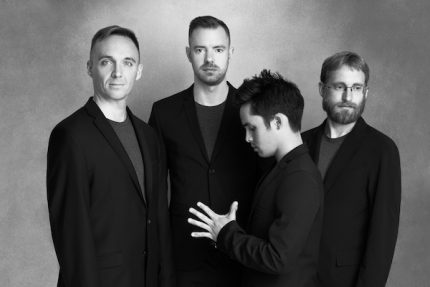JACK Quartet’s artistry illuminates the darkness of Haas quartet

Do something different and they will come. That maxim is lost for many on Chicago’s music scene where hidebound repertoire and safety-first programming tends to predominate.
Give credit to the UChicago Presents series for bucking that trend Friday night with a concert by JACK Quartet that packed the Logan Center. There was just a single work on the program—Georg Friedrich Haas’s String Quartet No. 9—performed in total, pitch-black darkness.
The lights-out-requirement for performances of his Ninth Quartet is characteristic of Haas’ individual approach to music and presentation. The work is not even the Austrian composer’s only piece to be played in the dark, with a similar requirement for his Third String Quartet.
UCP executive director Amy Iwano laid out the ground rules for this evening in her introduction. There would be a two-minute demo with the lights out as a trigger-warning of sorts for any nyctophobes who felt they couldn’t handle sitting in darkness for the unbroken 45-minute span. No one in the capacity audience elected to leave nor were there any exits (or mishaps, fortunately) during the performance. With all stage lights and Exit signs shut off, the darkness was complete and enveloping in a way one rarely experiences—even after the usual visual period of adjustment to the dark there was nothing discernible to the eye for the entire length of the performance.
The Spektral Quartet continues to hold the local chamber music cup for stamina with their 2017 performance of Morton Feldman’s six-hour String Quartet No. 2 in its belated Chicago premiere. Yet, if not quite as daunting a test of endurance, the challenges here for the New York-based JACK Quartet—who exclusively perform contemporary music—are considerable as well.
With no scores to read in the dark, Haas’ expansive work has to be played entirely from memory. Nor were there the usual chamber aids of glances, visual cues or adjustments for musicians to time bowings and entrances, and maintain ensemble unity.
Haas’ Ninth Quartet is representative of his music—a somber spectral style meets Ligeti Light. An atom-blasted atmosphere reigns from the hushed initial scurrying of the three upper strings over a long cello drone, which is soon echoed by the violins. Microtonal buzzing leads to a sudden harsh chord and a jagged passage as the volume swells and descends.
With the excellent JACK players, Haas’ somewhat episodic style felt uncommonly organic and natural in its ebb and flow. Passages of astringent microtonal discord melded into extended, finely concentrated pages in which JACK’s remarkably precise degrees of pianissimo were hypnotic.
Even so, about 25 minutes in, the extreme dynamics, swelling crescendos and decrescendos, and asymmetric pizzicatos start to become repetitious and the music tends to meander in its bleak rumination. Ultimately, Haas’ music doesn’t feel quite varied or compelling enough to justify the long span of his canvas. Past the halfway mark as the music trudges on, one begins to think that there is more than a whiff of gimmickry here—not just in the composer’s self-conscious darkness requirement but in the music itself.
That said, one could hardly wish for finer or more impressive advocacy by the JACK players. A couple ensemble lapses and fleeting moments of patchy violin intonation apart, the musicians—violinists Christopher Otto and Austin Wulliman, violist John Pickford Richards and cellist Jay Campbell—handled the unique performance challenges masterfully and provided stellar advocacy, bringing remarkably detailed and concentrated expression to Haas’ score.
Concerto Köln performs Vivaldi’s The Four Seasons and other Baroque concertos 7:30 p.m. February 28 at Mandel Hall. chicagopresents.uchicago.edu
Posted in Performances




